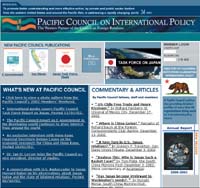Can Japan Come Back? The Pacific Council Thinks So
Back to Contents of Issue: February 2003
|
|
|
|
by Bruce Rutledge |
|
 THESE DAYS, UPBEAT REPORTS on Japan are seen about as much as 2,000 yen notes. That's why the
Pacific Council
on International Policy's recent report on Japan seems so unusual. "We believe that the fashionable notion of a Japan in inexorable decline is misleading," the council's task force says in its 52-page report entitled Can Japan Come Back? THESE DAYS, UPBEAT REPORTS on Japan are seen about as much as 2,000 yen notes. That's why the
Pacific Council
on International Policy's recent report on Japan seems so unusual. "We believe that the fashionable notion of a Japan in inexorable decline is misleading," the council's task force says in its 52-page report entitled Can Japan Come Back?The council, a private group of business and political leaders in the western US and around the Pacific Rim, formed the task force to study Japan during 2001 and 2002. Members include former US ambassador to Japan Michael Armacost, Glen Fukushima of Cadence Design Systems, Joichi Ito of Neoteny and a slew of retired executives, working journalists and academics. This group concludes that the key to Japan's success lies with its women, immigrants, foreign investors and small businesses. (Can you hear the right-wing sound trucks starting their engines?) The council finds that as the nation's demographics change, these groups will become more and more important to the economy, and government-led reform to help these groups is needed in the near term to ensure that Japan gets stronger. "The Japanese government must do much more to encourage the drivers of change that will make the economy more competitive -- small- and medium-sized enterprises, corporate reform, women, immigrants and foreign investors and employers," the report says. "To help SMEs, for example, the government needs to develop a tax system that positively encourages -- and does not discourage -- entrepreneurial activity and risk-taking. The government, which has long fostered major industry, needs to develop more effective policies for nurturing SMEs. To bring more women into the work force, the government needs to enforce existing anti-discrimination laws and bolster social services such as day care. Meanwhile, official barriers -- and attitudes -- to a dynamic foreign presence in Japan need to ease." If these changes take place -- and the council seems cautiously optimistic that they will -- then Japan will thrive, the council says, and anyone writing off the world's second largest economy does so at their own risk. "With China rising, some see Japan as a second-tier power of only modest relevance to the future of Asia and to the United States as a trading and strategic partner. That judgment, however, is wrong -- dangerously so," says the report. The council's optimism comes, in part, from a sense that some artificial obstacles to change here will crumble under the weight of demographic change. For example, the council notes that, according to one source, there were only 31 bankruptcy lawyers in the nation a few years ago, which meant corporate bankruptcies couldn't proceed quickly even if the companies wanted them to. The council also notes that Japan is suffering a net outflow of 130,000 people a year with an average age of 38.5. And 70 percent of these people are women. These stats are staggering -- a country desperately in need of young people to power its economy and to promote change is incapable of keeping them. Part of the problem, the council says, is that much of the old system is still in place. Bureaucrats still hold too much power, there is still way too much corporate corruption, and the old boys still have too much influence. Consider Shiseido, a company that makes products for women. The board is all male and many of these guys are elderly, the council says. Couldn't Shiseido find one woman qualified to sit on the board of a cosmetics company? The council puts a lot of faith in the new generation of political leaders. This is probably the weakest part of the report. Anyone following the hopeless attempts of the young Democrats to oust Yukio Hatoyama and Naoto Kan from party leadership will probably agree. Being young does not equate with being effective. But still, much of the report makes sense. There's always a bit of wishful thinking in the doomsday scenarios that flit through the foreign populace in Japan. This report seems much more real and to the point. Since we don't get a lot of upbeat news on Japan these days, let's end here, at one of the council's most optimistic points: "Japan's global influence is not limited to investment. Japan continues to be a world leader in high technology, a leadership based on an educated work force and a history of product innovation. It has also become a major exporter of popular culture, particularly to the rest of Asia, where its television programs, music, food and fashion have legions of fans." "Indeed, it is not difficult to imagine Tokyo becoming the center of an Asian pop-culture and entertainment industry rivaling Hollywood in the Far East." |
|
Note: The function "email this page" is currently not supported for this page.





